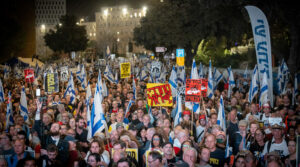
Thousands attend an antigovernment protest outside the Knesset in Jerusalem on March 31, 2024. (Chaim Goldberg/Flash90)
By Ben Sales
(JTA) — In the largest antigovernment demonstration since Oct. 7, thousands of protesters gathered in Jerusalem to call on Israeli Prime Minister Benjamin Netanyahu’s government to step down and for Israel to reach a deal to free the hostages held in Gaza.
And in a dramatic turn in Tel Aviv, the main organization lobbying on behalf of the families of Israeli hostages in Gaza said it would cease its Saturday night rallies in what has come to be known as Hostages Square and instead join in anti-government protests that have taken place in a different location several blocks away.
“This is the last Shabbat that we will be here,” Eli Albag, whose daughter Liri is a hostage, told the Hostages Square crowd. “We won’t meet here anymore, we will be in the streets… this is the moment where we turn off the lights.”
The Jerusalem demonstration on Sunday night kicked off a four-day vigil by the protesters in front of the Knesset, Israel’s parliament, and came following an antigovernment protest in Tel Aviv on Saturday night that likewise drew thousands. Protesters in Jerusalem attempted to block a nearby highway and lit bonfires on its lanes, while some set up tents to camp out in the capital. Organizers said 100,000 attended the demonstration.
Taken together, the demonstrations and their tactics were a return to the days before Hamas’ invasion of Israel on Oct. 7 launched the war. At that time, weekly demonstrations centered in Tel Aviv routinely brought more than 100,000 people into the streets to protest Netanyahu’s government and its effort to weaken the judiciary.
Those protests came to an abrupt halt on Oct. 7 and the protest groups pivoted to providing aid and relief to victims of the attack as well as soldiers. But recently, some of the same groups have been organizing growing weekly demonstrations against Netanyahu and calling — often with family members of the hostages — for the government to do more to secure a deal for their release.
The demonstrators blame the government for negligence surrounding Oct. 7. and for failing to get the rest of the hostages out — more than 100 were released during a ceasefire in November. This week, they also took aim at the Knesset for taking a six-week recess that will begin on April 7, the six-month anniversary of the war. Polls show that the current government, which took office at the end of 2022, has low approval ratings and would lose an election were it held today.
“First of all we want elections because we think this government is not representing the public and second of all we think it is not a good time to take a recess when the hostages are still there,” said Moshe Radman, a leader of the Jerusalem protest, according to the Times of Israel.
More than 130 hostages remain in Gaza, around 100 of whom are thought to be alive. Indirect negotiations between Israel had Hamas have stopped and started again in recent weeks, but Hamas has rejected Israeli offers of a temporary ceasefire and release of Palestinian security prisoners in exchange for the hostages. The terror group has demanded a permanent ceasefire and complete Israeli withdrawal from Gaza.
Family members of hostages spoke at both rallies. Addressing Netanyahu, Einav Zangauker, whose son Matan is being held captive, said in Jerusalem on Saturday night, “We will work to immediately replace you. We have concluded that that is the fastest way to bring a deal. … We will demonstrate and demand your ouster. We will publicly hound you.”
Yair Lapid, the leader of Israel’s parliamentary opposition, spoke at the Jerusalem rally and decried the government for being irresponsible and ineffective.
“If we want to end the war, we need a different government,” Lapid said. “This government will not win.”
Itamar Ben-Gvir, the far-right national security minister, focused his criticism of the rally on Brothers in Arms, a combat veterans group that led the anti-judicial overhaul protests last year and was one of the organizers of Sunday’s protest in Jerusalem.
“I fiercely condemn the provocateur organization ‘Brothers in Arms’ that occupies itself time and again with fanning the flames of civil war and dividing Israeli society,” Ben-Gvir wrote on X, formerly Twitter. “They are the ones who led a campaign to refuse [military duty] before Oct. 7, and now are continuing their message of provocation and hate. They are the last ones who should purport to care for Israel’s security.”


